Just when you thought honey was off-limits for diabetics, a deeper dive into its nutritional profile may surprise you.
Are Diabetics Allowed Honey?
You're probably thinking that honey, that sweet nectar of nature, is off-limits if you're diabetic. After all, it's as sweet as a penny-farthing is tall. But, let's not jump to conclusions.
Honey isn't your typical sweetener, and understanding its unique nutritional profile might change the way you view it.
So, is honey a friend or foe when it comes to managing your blood sugar levels? Well, let's explore this topic a bit further.
Key Takeaways
- Honey, while rich in essential nutrients and antioxidants, should be consumed in moderation by diabetics due to its high sugar content.
- Diabetics need to be cautious with honey consumption as it can raise blood sugar levels, although it may have a milder impact compared to table sugar.
- When considering sweeteners, options like stevia and erythritol, which have minimal impact on blood sugar, can be safer choices for diabetics.
- Consulting healthcare providers and understanding how different sweeteners affect blood sugar levels are crucial for effective diabetes management.
Understanding Diabetes and Diet
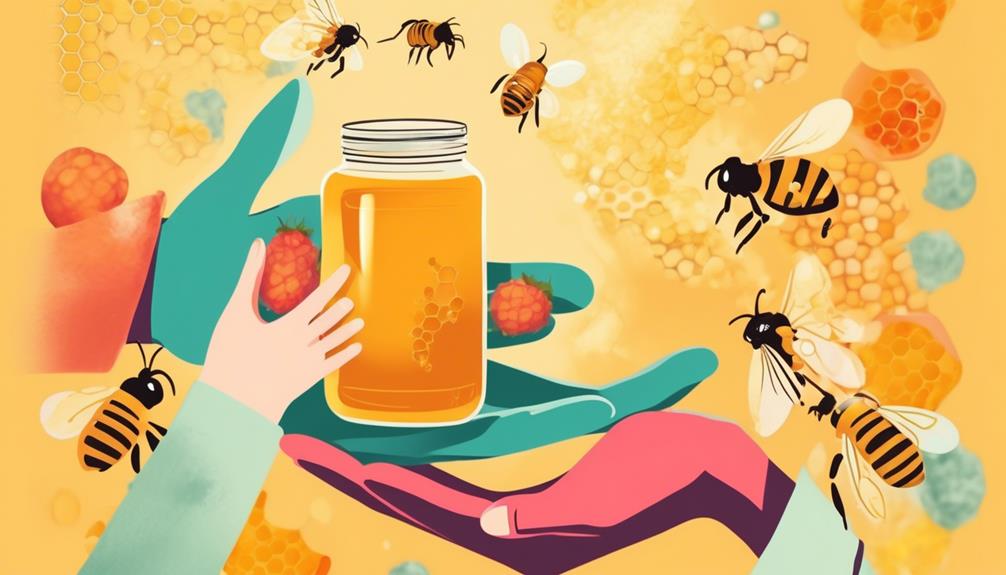
When managing diabetes, it's crucial to understand how different foods, including honey, can impact your blood sugar levels. You must be proactive in monitoring your consumption of carbohydrates, sugars, and fats. Honey, while a natural sweetener, still contains high amounts of sugar. Therefore, you should treat it as you'd any other sugar in your diet.
However, not all sugars are created equal. Honey, for example, has a lower glycemic index (GI) than table sugar, meaning it raises blood sugar levels more slowly. This can be beneficial for diabetics, as it allows you to better manage and predict blood sugar spikes.
Analyzing your diet and comprehending the impact of different foods on your blood sugar isn't just about avoiding certain items. It's also about making informed choices, balancing your intake, and understanding your body's responses. Remember, moderation is key. Even healthy foods, when consumed in excess, can throw off your blood sugar balance.
Incorporating honey into your diet can be a part of your diabetes management plan, but it requires careful consideration and planning. As with any change in diet, it's recommended to consult with your healthcare provider or a dietitian first.
The Nutritional Profile of Honey
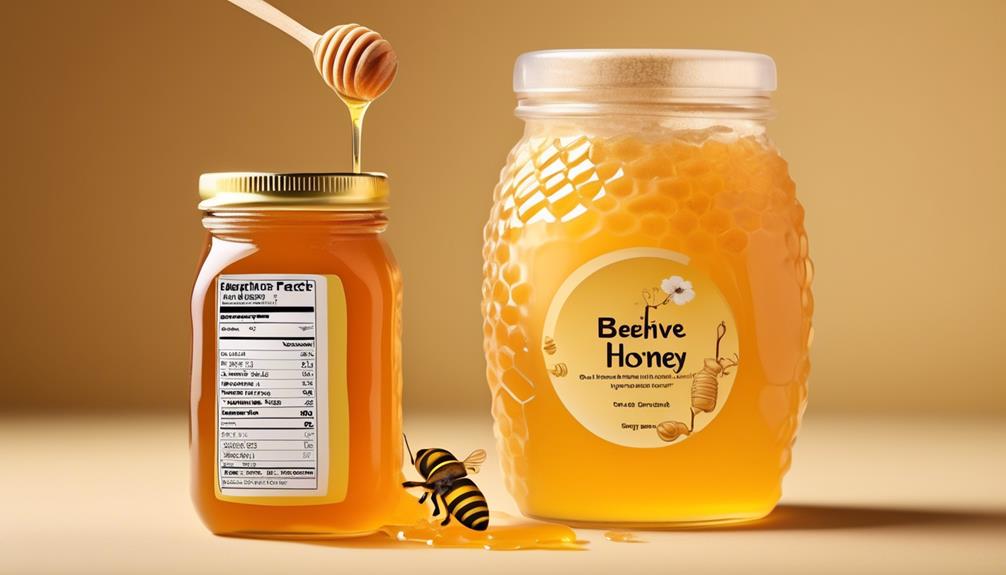
Diving into the nutritional profile of honey, you'll find it's more than just a natural sweetener – it's packed with essential nutrients that can benefit your health. From vitamins and minerals to antioxidants, honey offers a great deal of nutritional value.
Let's break it down in the following table:
Nutrient | Amount per 100g | Benefits |
|---|---|---|
Calories | 304 | Energy source |
Sugar | 82g | Quick energy |
Antioxidants | Varies | Fights free radicals |
High in calories and sugar, honey gives you a quick energy boost. But what sets it apart are the antioxidants. These substances help combat free radicals in your body, promoting overall health.
However, it's not all sunshine and rainbows. Due to its high sugar content, honey can be problematic if you're watching your blood sugar levels. For diabetics, this could mean that honey, while nutritious, might not be the best choice.
Honey's Impact on Blood Sugar Levels
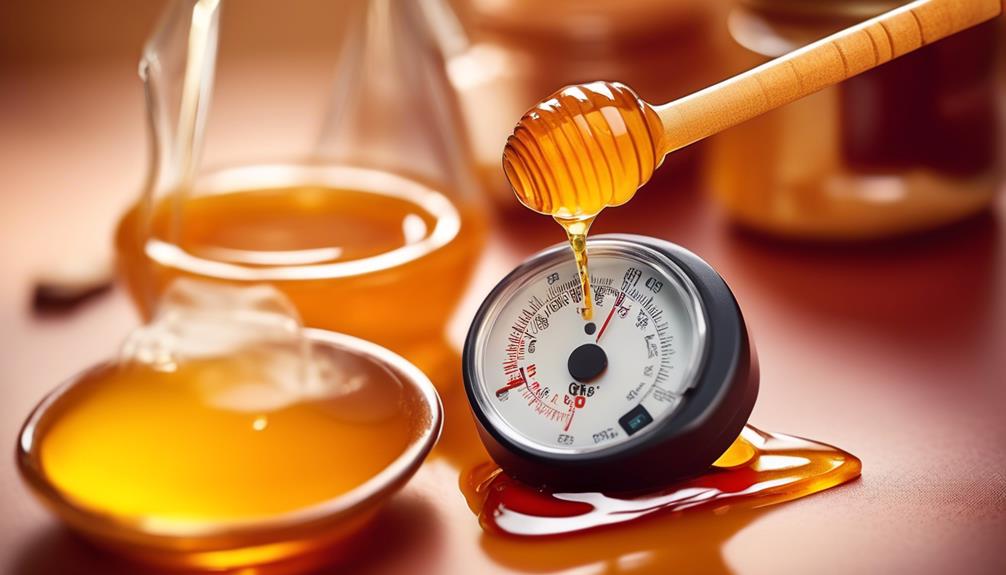
While honey's nutritional profile is enticing, it's crucial to understand its impact on blood sugar levels, particularly for those with diabetes. Honey is a natural sugar, containing fructose and glucose, which can raise blood sugar levels. This isn't to say you should avoid honey entirely, but moderation is key.
When you consume honey, your body breaks it down into glucose and fructose. These sugars are absorbed into your bloodstream, causing your blood sugar to rise. If you're diabetic, this can be problematic. Your body struggles to produce enough insulin, the hormone that regulates blood sugar, so consuming high amounts of honey could lead to spikes in your blood sugar levels.
Interestingly, some studies suggest that honey may have a less dramatic impact on blood sugar levels than other types of sugar, due to its slightly lower glycemic index. However, it's worth noting that these studies are limited and more research is needed.
Comparing Honey With Other Sweeteners
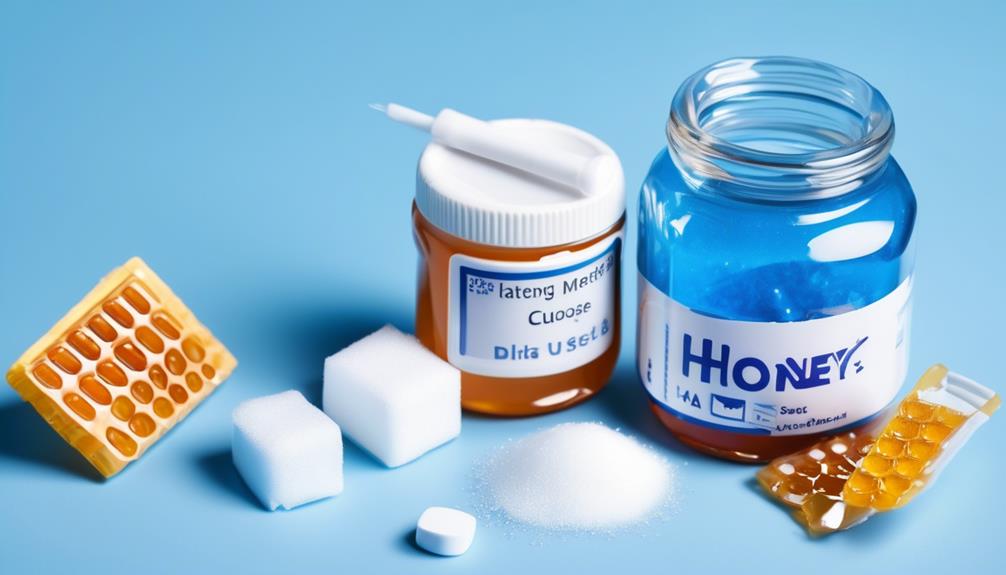
In the realm of sweeteners, honey offers a unique nutritional profile, but it's essential to compare it with other options to fully understand its potential effects on diabetes. You should consider not only the sweetness of these alternatives but also their impact on your blood glucose levels.
Sweetener | Glycemic Index | Key Considerations |
|---|---|---|
Honey | 58-61 | Natural, contains vitamins & minerals, but still raises blood sugar |
White Sugar | 65 | Highly processed, can spike blood glucose levels |
Maple Syrup | 54 | Lower GI than honey, but still needs moderation |
Agave Nectar | 19 | Lower GI, but high in fructose which can lead to insulin resistance |
Stevia | 0 | Natural, no impact on blood sugar, but some find aftertaste unpleasant |
While honey does have a lower glycemic index (GI) than white sugar, it's higher than some other natural sweeteners like agave nectar and maple syrup. Remember, a lower GI doesn't mean it's free reign; moderation is still key. Stevia may be a better option with a GI of 0, but taste can be a deciding factor. Analyze these options and pick what suits your needs and preferences the best.
Safe Sweetening Alternatives for Diabetics
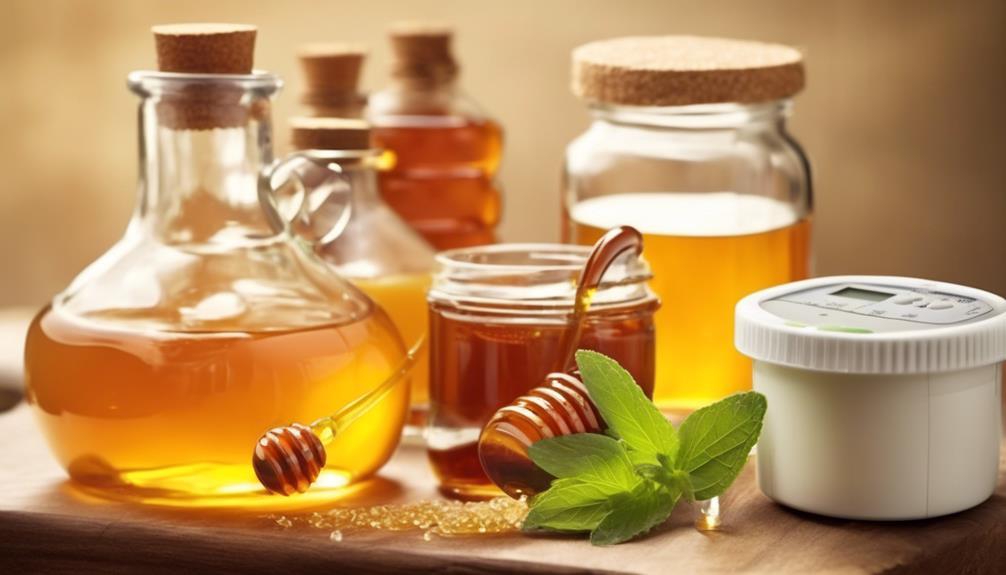
Navigating the world of sweeteners can be tricky for diabetics, but there are safe alternatives that won't spike your blood sugar levels.
One such option is stevia, a zero-calorie, natural sweetener derived from the leaves of the Stevia rebaudiana plant. It's about 200 times sweeter than sugar, so you'll use less, and it doesn't raise blood glucose levels.
Erythritol, a sugar alcohol, is another good pick. It has almost no calories and doesn't affect blood sugar or insulin levels. However, it may cause digestive issues if consumed in large amounts.
Agave nectar, though higher in fructose, has a low glycemic index and is sweeter than sugar, so less is needed. Be cautious, though, as excessive fructose can lead to weight gain and other health problems.
Conclusion
In conclusion, you can include honey in your diet if you're diabetic, but in moderation. Although honey affects blood sugar levels less than other sweeteners, it still raises them. Consequently, consuming it excessively can be harmful.
It's essential to balance your sugar intake with other nutritional needs. Opt for safe sweetening alternatives and maintain a balanced diet for effective diabetes management.
Always remember, monitoring your blood sugar levels is crucial.


